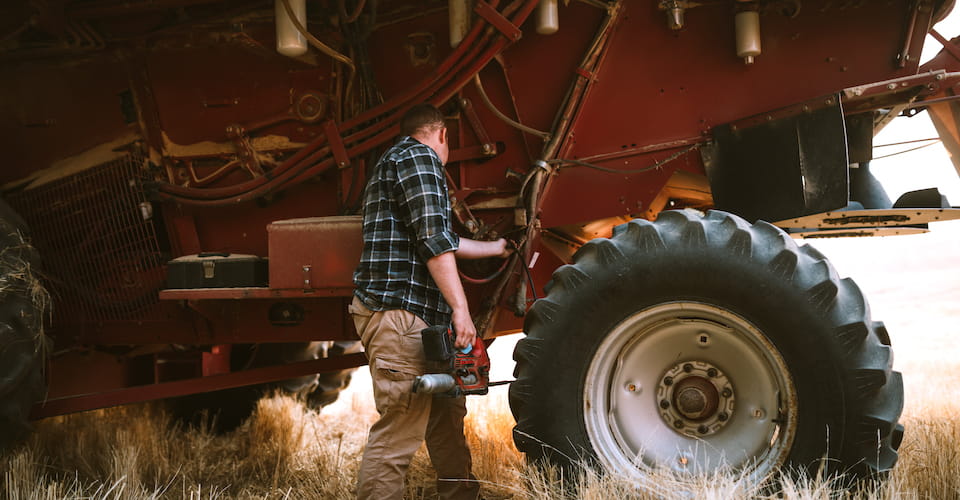
What grease is best for a heavy-duty fleet?
Premium equipment grease keeps your vehicles running longer and more efficiently. Cenex® understands that choosing the right grease is crucial to protect your investment. This guide will look at the things to keep in mind to make the best choice for your heavy-duty fleet.
The importance of choosing the right grease
There are a few important reasons not to cut corners when it comes to lubricant, including:
- Extending component life: High-quality grease creates a long-lasting barrier between components, reducing friction and wear with prolonged use. This is ideal for heavy-duty fleets that cover thousands of miles at a time.
- Reducing maintenance costs: By protecting each vehicle component with premium grease, you’ll spend less time with your vehicles in the garage for maintenance and repairs.
- Improving performance: Choosing the ideal grease for your fleet also improves fuel efficiency and vehicle performance, even in the harshest conditions.
4 factors to consider when choosing grease for your fleet
Between recruiting and training drivers, maintaining compliance and tracking their drivers, fleet managers have plenty to think about already. The added protection of premium lubricants can provide some peace of mind. Which grease is best for your fleet depends on several factors.
1. Manufacturer specifications
Most original equipment manufacturers (OEM) will specify which type of grease is best in the owner’s manual. This is the first place you should look to determine which grease to choose for your fleet vehicles. The manual should give recommendations regarding:
- Consistency grade
- Classification: LB (chassis), GC (wheel bearing), or both, GC-LB
- Grease thickener type
- Performance features like load-bearing capacity and temperature resistance
While manufacturers aren’t allowed to void warranties for going against OEM recommendations, they are a good place to start when choosing the right grease.
2. NLGI grade
The National Lubricating Grease Institute (NLGI) assigns different lubricants a “consistency number” or “NLGI grade.” This scale measures the thickness of a lubricant and runs from 000 (fluid) to 6 (very hard).
An NLGI rating of 2, the middle of the scale, is the most common for greasing heavy-duty vehicle components. NLGI 2 grease has a peanut butter-like consistency. For fleets in areas with colder climates, a more fluid grease, such as an NLGI 1 or 0, may be more appropriate.
3. Grease compatibility
Fleet managers often have several grease options that could work for their vehicles. However, different types of grease don’t always play well together. Before switching from one grease to another, check to see which grease thickener types are compatible with the grease you already use on your vehicle. For example, lithium complex grease is incompatible with greases using polyurea bases.
4. Application-specific tolerances
No two heavy-duty fleets operate in the exact same conditions. Some fleets have to travel farther, while others have to endure more extreme conditions. Here are some specifications you should account for when choosing grease for your fleet:
- Temperature: Heavy-duty fleets commonly see temperature extremes on both ends of the spectrum. You should choose a grease that can hold up to both extreme heat and cold.
- Load size: Your heavy-duty vehicles will most likely need to perform under significant loads as well as shock loading. All of this increases metal-to-metal contact, so it’s best to opt for a grease that will extend equipment life even with the added weight.
- Moisture resistance: In more humid areas, moisture can lead to water washout, rust and added grease consumption. If your fleet operates in high-humidity environments, make sure your grease has sufficient water resistance.
- NLGI grease service level approvals: The NLGI specifies for which parts/functions certain greases are designed. For wheel bearings, you should use GC-certified grease, while chassis greasing requires LB certification. A grease that meets the requirements for both bearing and chassis lubrication will have a certification of GC-LB.
What happens when you choose the wrong grease?
Choosing the wrong grease for your heavy-duty fleet can lead to:
- Premature component failure
- Poor fuel efficiency
- Increased maintenance costs
- Reduced vehicle lifespan
- Safety risks
- Lower productivity due to increased downtime
Cenex premium lubricants: protect your fleet
For your business to run smoothly, your vehicles have to run smoothly, mile after mile. Cenex lubricants are specially formulated to protect high-mileage engines and keep your vehicles on the road longer. Choose Cenex premium equipment grease for your heavy-duty fleet.









